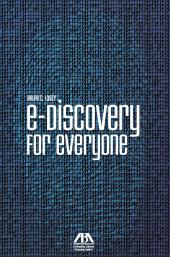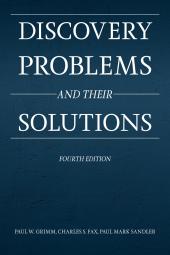e-Discovery for Everyone
Select a format
 International Order Inquiry
International Order Inquiry
Select subscription type
Terms & conditions
Subscribers receive the product(s) listed on the Order Form and any Updates made available during the annual subscription period. Shipping and handling fees are not included in the annual price.
Subscribers are advised of the number of Updates that were made to the particular publication the prior year. The number of Updates may vary due to developments in the law and other publishing issues, but subscribers may use this as a rough estimate of future shipments. Subscribers may call Customer Support at 800-833-9844 for additional information.
Subscribers may cancel this subscription by: calling Customer Support at 800-833-9844; emailing customer.support@lexisnexis.com; or returning the invoice marked "CANCEL".
If subscribers cancel within 30 days after the product is ordered or received and return the product at their expense, then they will receive a full credit of the price for the annual subscription.
If subscribers cancel between 31 and 60 days after the invoice date and return the product at their expense, then they will receive a 5/6th credit of the price for the annual subscription. No credit will be given for cancellations more than 60 days after the invoice date. To receive any credit, subscriber must return all product(s) shipped during the year at their expense within the applicable cancellation period listed above.
The total price includes the product(s) listed in the Order Form and any Updates for a limited period (minimum period of 30 days) after the order is placed ("Order Window"). Shipping and handling fees are not included in the grand total price.
All shipments may be returned, at subscribers' expense, for full credit of the Price within 30 days of receipt.
Shipments may not be returned, and no credits will be issued, more than 30 days after receipt.
After the Order Window, subscribers will receive notice of Updates along with the then-current grand total price and order process as Updates become available. Subscribers will only be shipped those Updates they specifically request.
Product description
Part of the problem lies with not knowing where to begin to develop the knowledge and experience needed to survive in the daunting new world of e-Discovery. Where do you turn to learn what the issues are, let alone how to resolve them? Most lawyers are not computer scientists, statisticians, or semanticists, and getting the training to be competent in using computer assisted review (also called technology assisted review, or "TAR") to more effectively and inexpensively search large digital information sets seems beyond our grasp.
Enter Ralph Losey and the ABA with e-Discovery for Everyone, an introduction to e-Discovery that avoids over-technicality, without being substantively superficial, and manages to be interesting and at times even amusing. Ralph has been writing his e-Discovery Team blog since 2006, and e-Discovery for Everyone assembles many of his most helpful and recent blog posts in a collection that will be of value to newcomers to e-Discovery as well as seasoned practitioners. The book is written in a conversational style, and is divided into short chapters easily read in a relatively short sitting. Sprinkled throughout are very helpful references to cases, secondary sources and other materials that give the book depth beyond its relative brevity. A quick look at the table of contents shows an impressive inventory of the most important e-Discovery topics of the day: new methods of search and review, a discussion of the 2015 amendments to the Federal Rules of Civil Procedure, practical advice on litigation holds, how to evaluate the reasonableness of e-Discovery vendor bills, the advantages of transparency in selecting how to design a search for digital information, why cooperation during the e-Discovery process is essential to success, ethical issues associated with e-Discovery, and how to confront and control e-Discovery abuses.
eBooks, CDs, downloadable content, and software purchases are noncancelable, nonrefundable and nonreturnable. Click here for more information about LexisNexis eBooks. The eBook versions of this title may feature links to Lexis+® for further legal research options. A valid subscription to Lexis+® is required to access this content.
 Lexis Nexis
Lexis Nexis 
